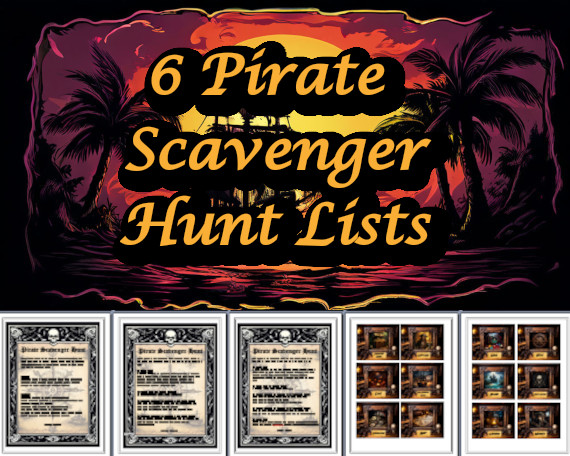
Class 2 - Where Do You Begin
"It's
always best to start at the beginning." - Glinda the Good Witch (The
Wizard of Oz)
"Start at the beginning"
"Yes, and when you get to the end, stop." - The March Hare and
the Mad Hatter (Alice in Wonderland)
Who could argue with such wisdom?
 |
6 Pirate Themed Scavenger Hunt Lists - Download them all now! With six different lists to choose from, you won't have any trouble finding the perfect activity you'd like to plan. There's even a for prereaders (with images only.) High quality images are also included that can be printed and hidden so that your scavenger hunt can be set up just about anywhere. Photo hunt options, bonus points and even a couple puzzles thrown in. You'll find the list that's just right for you! CLICK HERE TO DOWNLOAD THEM! |
In the past, when I've been hired by clients to set up a Quest, it's typically
not until the actual event that they truly understand what it is that
they've paid for. No amount of photographs or slide presentations can
fully illustrate a Quest because we're talking about an experience. If
I've done my job well, the participants forget that what they are going
through isn't real…they get absorbed into the world I create and
find that it's a LOT of fun!
So…what IS a Quest? Well, the best definition I can provide at the
onset is this:
Quest: noun. A fabricated experience designed for the sole purpose of
providing someone with an as true to life adventure as possible within
the constraints of the theme and resources. This is constructed and executed
using any number of tools including (but not limited to) live characters,
mail and email, phone calls, storylines and physical activities.
"So it's like a treasure hunt?"
Well, that depends on whether or not you WANT it to be a treasure hunt.
One of the very first steps in creating a Quest for someone else is that
you must come up with the goal for the participant(s). Will they be searching
for pirate's treasure? Trying to recover a lost Aztec idol? Those sound
like a lot of fun…but let's think beyond that for moment…Why
not have them break someone out of jail? Or maybe hunt down an actual
vampire?
In a Quest, I attempt to create an adventure through recreating a theme,
that's usually, but not always, historical. For example, if I were designing
a pirate quest, I would put the teams smack dab in the middle of an actual
pirate town with stage props, lighting, sound effects and live characters
walking around. The players would need to actually place themselves mentally
in that environment in order to move along in their adventure. By speaking
to different characters, they would learn as a team of some great adventure
just waiting to be undertaken. Perhaps they would hear of a woman who
had been kidnapped, or of a treasure that is waiting to be found. No matter
the goal, the teams would actually move throughout the physical world
I have created (however elaborate due to budget, or sometimes lack thereof).
"I don't know…this sounds a lot like one of those Live Role
Playing games where everyone gets in costume and pretends…"
Although Live Role Playing can be a blast for those that enjoy that game
format and experience, Quests are very different in two major ways. The
most significant difference is that the experience requires the participant(s)
to be THEMSELVES. True, you could absolutely set up a Quest within a Live
Role Playing game campaign (for allof you LARPers reading this) where
the participants are experiencing the adventure within character. However,
one could argue that Quests are just as much fun, if not more, to play
as YOURSELF. It's a REAL test to see if YOU have what it takes to be a
spy, archeological adventurer, etc.
The second major difference is that the entire experience is fully designed
and scripted from beginning to end…but NOT for the person ON the
Quest. The illusion is that the adventure is organically happening. The
careful, behind the scenes planning allow for elaborate storylines, narrow
escapes and intricate plots connected to real problem solving that you
just can't accomplish if everyone was 'improvising as they went along.'
As I describe details for designing a Quest, I'll be referring to two
different large scale Quests that we designed through my adventure company
Quest Experiences: The Search for the Holy Grail and Nosferatu.
In a quest we designed for Halloween, entitled Nosferatu, the guests traveled
through the streets of Crimson Hollow, a fictitious Transylvanian town
we imagined. They literally ran from vampires as they searched for the
town's few survivors in hopes of learning how to overcome Luther, the
Head Vampire. They met a priest in a church, collected some bones from
an old graveyard, and even plucked some fur off of a sleeping werewolf!
In In Search of the Holy Grail, guests worked together to reclaim the
infamous chalice for Camelot. They traveled throughout my own English
countryside facing wizards, knights, and even King Arthur himself as they
raced against time to be the first team to recover the Holy Grail.
One might guess that these were all for children's parties, right? Wrong.
In fact, 90% of the quests produced through Quest Experiences have been
EXCLUSIVELY for adults (18-60 years old).
So, how do you get started?
Indulge me for a minute. I promise it will not hurt, much. I want you
to remember a time (usually after reading a great book or seeing an exciting
movie) when you wished you could have been one of the characters. Have
you always wanted to be a knight and rescue a princess from a dragon?
Perhaps steal secret foreign plans to avoid a third world war? Ever want
to be Indiana Jones or perhaps a Jedi Knight in Star Wars?
I will wait while you do this.
Waiting…
Okay, do you have your character? Good. If not, well lie and tell me you
do. Chances are that if you felt inspired to be that character, then others
have as well and the movie makers and/or writers did his/her job. Through
your Quests, you are going to give your guest(s) an opportunity to live
out an exciting adventure. How are you going to do that? I'm glad you
asked.
Continue the course with Class
3: Themes and Storylines.